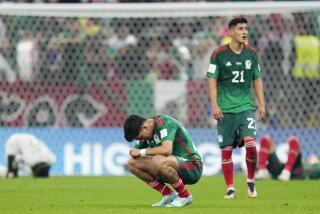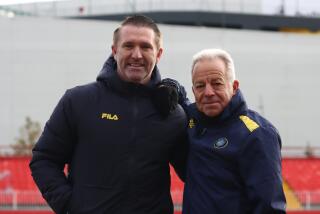U.S., Mexico Ride Collision Course
In this neck of the soccer woods, the tallest tree has always been Mexico, with the United States showing some impressive growth over the last decade.
The two countries should prove their standing once again in the coming weeks, starting Wednesday, when the 12-nation CONCACAF Gold Cup is played in six U.S. cities, including Los Angeles.
Mexico is the defending champion and the favorite. The U.S. is at home, which levels the field a little more. Barring upsets, the Americans and Mexicans should meet in the July 24 final at Giants Stadium.
Ten teams stand in their way -- eight of their neighbors from the North and Central American and Caribbean (CONCACAF) region and two guests, Colombia and South Africa.
The tournament, played about every two years, offers different challenges to different teams.
For Panama, South Africa and Trinidad and Tobago, it offers the chance to find out how to salvage their rapidly sinking World Cup hopes.
All three countries are in danger of not reaching Germany ’06 and need to rediscover a way to win before qualifying resumes in August. Most of South Africa’s top players turned down the chance to play in the Gold Cup, however.
For Canada, Cuba, Honduras and Jamaica -- each already out of World Cup contention -- it offers something to do during the summer and not much more than that, although the Canadians could spring a surprise, as they did by winning the Gold Cup in 2000.
For Colombia, Costa Rica and Guatemala, it provides the opportunity to fine-tune their teams for the run-in to Germany.
Colombia is in fifth place behind Argentina, Brazil, Ecuador and Paraguay in South American qualifying, and Costa Rica and Guatemala are battling for third place in the CONCACAF region behind Mexico and the U.S.
And then there are the favorites.
Mexico, which plays South Africa, Guatemala and Jamaica in the first round, comes into the Gold Cup riding higher than ever.
Admittedly, its 20-game unbeaten streak was ended at the recently concluded FIFA Confederations Cup in Germany, but Argentine-born Coach Ricardo Lavolpe’s squad finished a more-than-respectable fourth, surprising many with its stylish and resourceful play.
Along the way, Mexico, ranked sixth in the world, defeated eventual champion and World Cup holder Brazil, 1-0, and Asian champion Japan, 2-1, and tied European champion Greece, 0-0.
Mexico tied Argentina, 1-1, in the semifinals but was ousted on penalty kicks after extra time. Finally, it lost, 4-3, in extra time to Germany in the third-place match.
“We did well, but we didn’t achieve what we wanted to achieve,” said star striker Jared Borgetti. “I feel that we can do better in the World Cup.”
Borgetti will play in the Gold Cup, but among the big names who won’t play for Mexico are No. 1 goalkeeper Oswaldo Sanchez of Chivas de Guadalajara and the country’s only two European-based players, both of them in Spain: defender Rafael Marquez of FC Barcelona and midfielder Gerardo Torrado of Racing Santander.
Also absent are the hugely influential left winger Ramon Morales of Chivas de Guadalajara, midfield linchpin and nine-year national team veteran Pavel Pardo of Club America, and rapidly rising striker Jose “El Kikin” Fonseca of Cruz Azul.
Even without those six players, however, Lavolpe has a deep and talented squad at the Gold Cup, with 11 of his 23 players drawn from the Confederations Cup roster.
Borgetti, the Pachuca striker whose five goals in Germany made him the joint second-leading scorer in the tournament, is the unquestioned danger man and top aerial threat, but such players as Omar Bravo, Luis Ernesto Perez and the Brazilian-born Antonio Naelson, who plays under the name of Zinha, are three others who could cause Gold Cup opponents problems aplenty.
Based on its pedigree, its roster and its form, Mexico, a four-time Gold Cup champion, should reach the final.
“My team has come on extremely well during the tournament,” Lavolpe said at the end of the Confederations Cup. “We have learned to take the initiative out on the field. We’ve played some of the biggest names around, and we’ve not fallen far short of beating them all.
“We believe in our ability to play good football, and we’ll start intensive preparations for the World Cup over the coming months.”
The only cloud on Lavolpe’s horizon -- and it is a dark one -- is that the Cruz Azul defensive duo of Salvador Carmona and Aaron Galindo was kicked out of the Confederations Cup after testing positive for a banned substance.
On Monday, Carmona and Galindo were suspended for one year by the Mexican federation, whose president, Alberto de la Torre, said the players took the anabolic steroid norandrosterone.
No such worries surround the U.S., which is ranked 10th in the world and opens play against Cuba in Seattle on Thursday, then plays Canada and Costa Rica.
Coach Bruce Arena has selected a strong team, evidence of his desire to win the tournament and to serve notice to Mexico that it is not the only tree in the forest.
Like Lavolpe, Arena is without some top players, the most notable being striker Brian McBride and defender Carlos Bocanegra, both of whom will play for Fulham of the English Premier League when it takes on an MLS All-Star team July 30 at Columbus, Ohio.
More interest, however, concerns those who are on the roster.
The Gold Cup offers the opportunity for as many as 11 American “bubble” players to show that they should be in Arena’s plans for Germany ’06.
The list includes goalkeeper Marcus Hahnemann. Arena said he wants to see Hahnemann play at least one game in the tournament. Kasey Keller should start the rest.
Then there are defenders Jimmy Conrad, Oguchi Onyewu, Tony Sanneh and Greg Vanney, as well as midfielders Chris Armas, Brad Davis, Clint Dempsey and Ben Olsen, and forwards Conor Casey and Pat Noonan.
*
(BEGIN TEXT OF INFOBOX)
Gold Cup
Gold Cup play begins Wednesday and runs through July 24. Top two teams in each group and the two best third-place teams advance to the quarterfinals (all times Pacific):
*--* DATE TIME GAME SITE TV Wednesday 4 p.m. Panama vs. Colombia Miami Telefutura Wednesday 6:15 p.m. Honduras vs. Trinidad Miami Galavision and Tobago Thursday 5:30 p.m. Costa Rica vs. Canada Seattle Galavision Thursday 7:45 p.m. U.S. vs. Cuba Seattle Telefutura Friday 7 p.m. Mexico vs. South Home Depot Univision Africa Center Friday 9 p.m. Guatemala vs. Jamaica Home Depot Galavision Center Saturday 11:30 a.m. Cuba vs. Costa Rica Seattle Telefutura Saturday 1:45 p.m. U.S. vs. Canada Seattle Telefutura Saturday 4 p.m. Panama vs. Trinidad Miami Galavision and Tobago Saturday 6:15 p.m. Colombia vs. Honduras Miami Telefutura Sunday Noon Mexico vs. Guatemala L.A. Univision Coliseum Sunday 2:15 p.m. Jamaica vs. South L.A. Galavision Africa Coliseum Monday 4 p.m. Trinidad and Tobago Miami Telefutura vs. Colombia Monday 6:15 p.m. Honduras vs. Panama Miami Galavision July 12 4 p.m. U.S. vs. Costa Rica Foxboro, Telefutura Mass. July 12 6:15 p.m. Canada vs. Cuba Foxboro, Galavision Mass. July 13 5 p.m. South Africa vs. Houston Galavision Guatemala July 13 7:15 p.m. Mexico vs. Jamaica Houston Univision July 16 10 a.m. Quarterfinal No. 1 Foxboro, Univision Mass July 16 1 p.m. Quarterfinal No. 2 Foxboro, Telefutura Mass. July 17 Noon Quarterfinal No. 3 Houston Univision July 17 3 p.m. Quarterfinal No. 4 Houston Telefutura July 21 3 p.m. Semifinal No. 1 East Telefutura Rutherford , N.J. July 21 6 p.m. Semifinal No. 2 East Univision Rutherford , N.J. July 24 Noon Final East Univision Rutherford , N.J.
*--*
GOLD CUP GROUPS
*--* GROUP A GROUP B GROUP C COLOMBIA CANADA GUATEMALA HONDURAS COSTA RICA JAMAICA PANAMA CUBA MEXICO TRINIDAD AND TOBAGO UNITED STATES SOUTH AFRICA
*--*
GOLD CUP CHAMPIONS
*--* Year Winner Runner-Up Year Winner Runner-Up 1991 United States Honduras 2000 Canada Colombia 1993 Mexico United States 2002 United States Costa Rica 1996 Mexico Brazil 2003 Mexico Brazil 1998 Mexico United States
*--*





